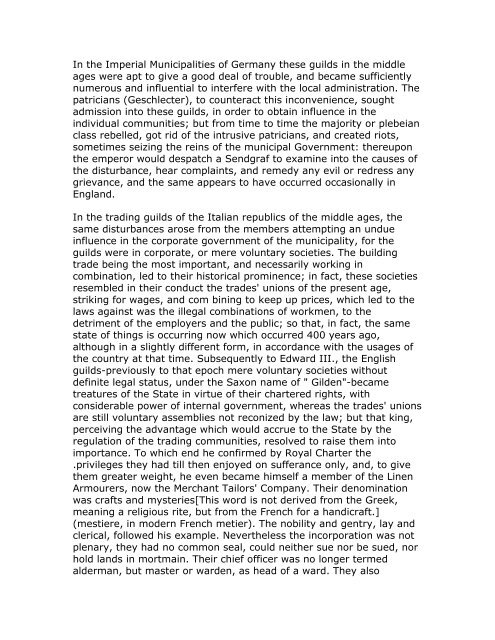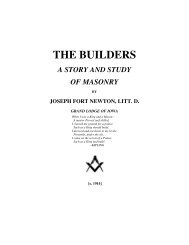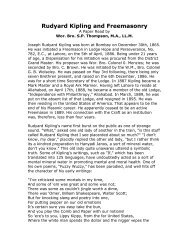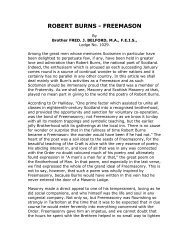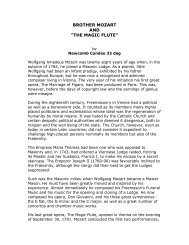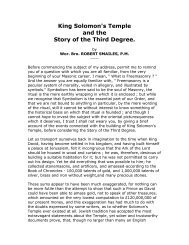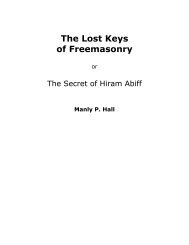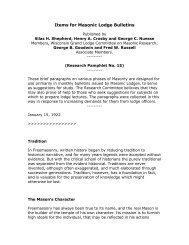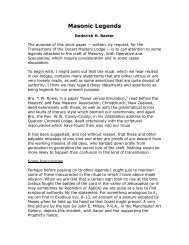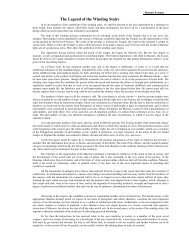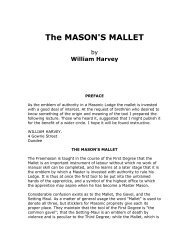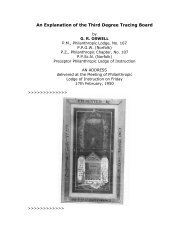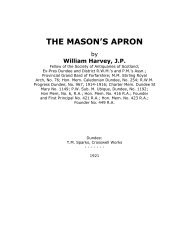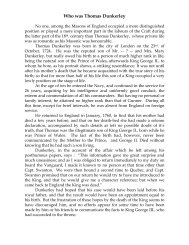The Albury MS. THE AMALGAMATED GUILD OF ... - RoseCroix.org.au
The Albury MS. THE AMALGAMATED GUILD OF ... - RoseCroix.org.au
The Albury MS. THE AMALGAMATED GUILD OF ... - RoseCroix.org.au
You also want an ePaper? Increase the reach of your titles
YUMPU automatically turns print PDFs into web optimized ePapers that Google loves.
In the Imperial Municipalities of Germany these guilds in the middle<br />
ages were apt to give a good deal of trouble, and became sufficiently<br />
numerous and influential to interfere with the local administration. <strong>The</strong><br />
patricians (Geschlecter), to counteract this inconvenience, sought<br />
admission into these guilds, in order to obtain influence in the<br />
individual communities; but from time to time the majority or plebeian<br />
class rebelled, got rid of the intrusive patricians, and created riots,<br />
sometimes seizing the reins of the municipal Government: thereupon<br />
the emperor would despatch a Sendgraf to examine into the c<strong>au</strong>ses of<br />
the disturbance, hear complaints, and remedy any evil or redress any<br />
grievance, and the same appears to have occurred occasionally in<br />
England.<br />
In the trading guilds of the Italian republics of the middle ages, the<br />
same disturbances arose from the members attempting an undue<br />
influence in the corporate government of the municipality, for the<br />
guilds were in corporate, or mere voluntary societies. <strong>The</strong> building<br />
trade being the most important, and necessarily working in<br />
combination, led to their historical prominence; in fact, these societies<br />
resembled in their conduct the trades' unions of the present age,<br />
striking for wages, and com bining to keep up prices, which led to the<br />
laws against was the illegal combinations of workmen, to the<br />
detriment of the employers and the public; so that, in fact, the same<br />
state of things is occurring now which occurred 400 years ago,<br />
although in a slightly different form, in accordance with the usages of<br />
the country at that time. Subsequently to Edward III., the English<br />
guilds-previously to that epoch mere voluntary societies without<br />
definite legal status, under the Saxon name of " Gilden"-became<br />
treatures of the State in virtue of their chartered rights, with<br />
considerable power of internal government, whereas the trades' unions<br />
are still voluntary assemblies not reconized by the law; but that king,<br />
perceiving the advantage which would accrue to the State by the<br />
regulation of the trading communities, resolved to raise them into<br />
importance. To which end he confirmed by Royal Charter the<br />
.privileges they had till then enjoyed on sufferance only, and, to give<br />
them greater weight, he even became himself a member of the Linen<br />
Armourers, now the Merchant Tailors' Company. <strong>The</strong>ir denomination<br />
was crafts and mysteries[This word is not derived from the Greek,<br />
meaning a religious rite, but from the French for a handicraft.]<br />
(mestiere, in modern French metier). <strong>The</strong> nobility and gentry, lay and<br />
clerical, followed his example. Nevertheless the incorporation was not<br />
plenary, they had no common seal, could neither sue nor be sued, nor<br />
hold lands in mortmain. <strong>The</strong>ir chief officer was no longer termed<br />
alderman, but master or warden, as head of a ward. <strong>The</strong>y also


